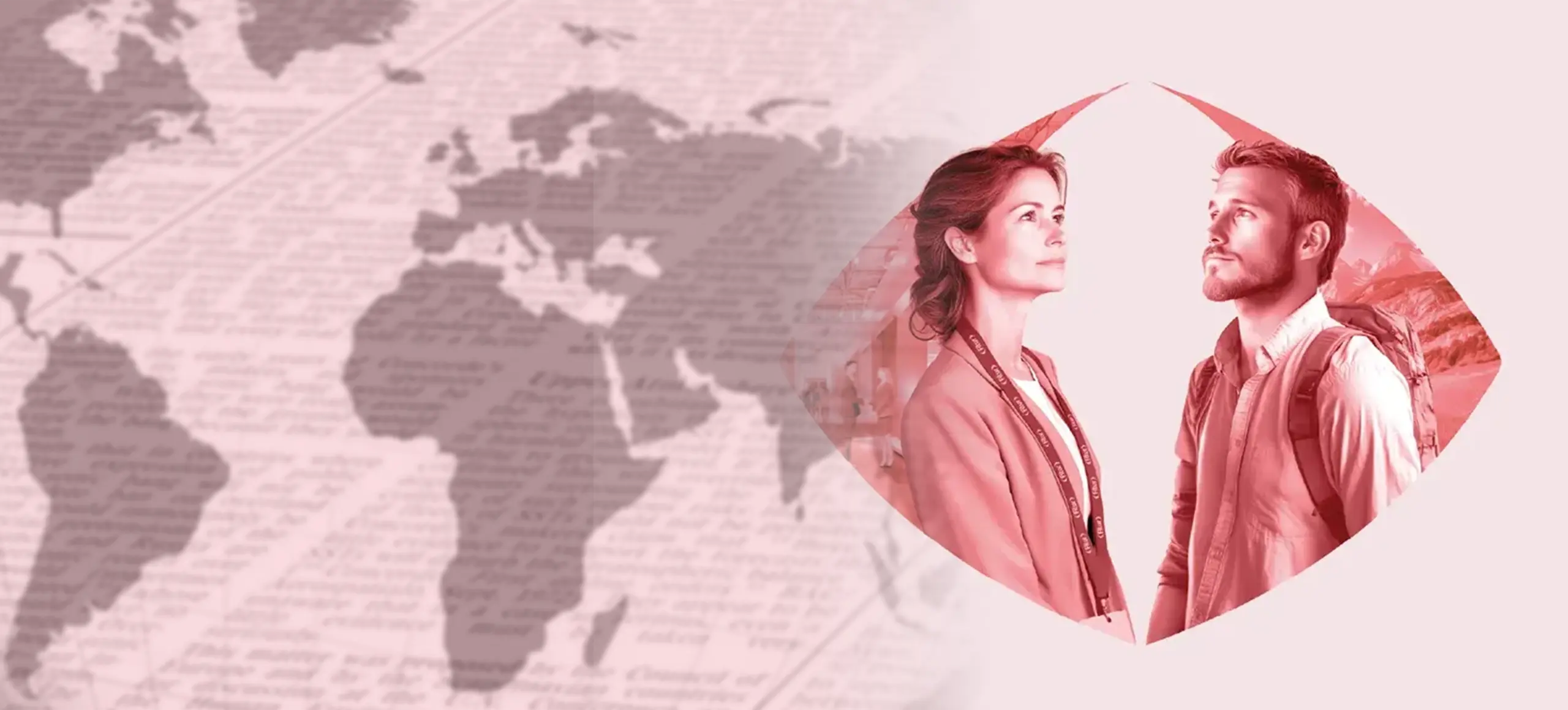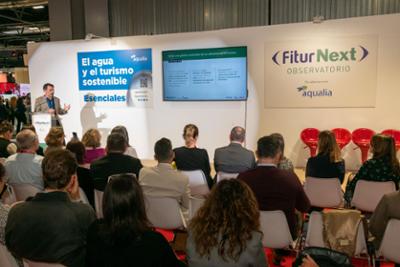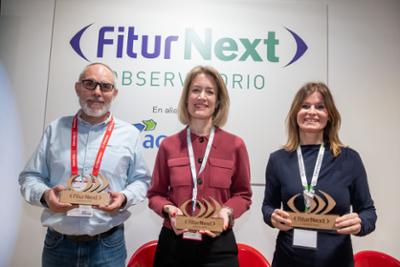

FiturNext 2025 kicks off its four days dedicated to sustainable food management in tourism

The FITURNEXT 2025 report, ‘Towards Sustainable Food Management Through Tourism’, is presented, highlighting good practices in the tourism sector and emphasizing the importance of caring for the planet and destinations through the food supply chain.
Rosario Sánchez Grau, Secretary of State for Tourism, along with Ignacio Gragera, Silvia Heredia, and Antonio Osuna, mayors of Badajoz, Écija, and Mérida, respectively, stand out among the key voices of FITURNEXT 2025.
FITURNEXT, FITUR's Sustainability Observatory dedicated to promoting good tourism practices, is launching its sixth edition, held in partnership with Aqualia, a benchmark brand in integrated water cycle management. Over the course of four days, from 22 to 25 January at the Madrid International Tourism Trade Fair organised by IFEMA MADRID, the Observatory will highlight the positive impact of tourism initiatives that contribute to more sustainable food management, promote zero surpluses and apply innovative technologies and circular systems.
One of the most important aspects of the inauguration will be the presentation of the report ‘Towards sustainable food management through tourism’, a document that includes the analysis, carried out by the Observatory throughout this edition, of projects and programmes in the private and public sector that promote food sustainability. Francisco Rodríguez, Head of Tourism at Ideas for Change, the entity that developed the research, was in charge of explaining the keys to the report and the research, highlighting that ‘replicability makes it easier for other actors to adapt something that already exists, to take advantage of the road already travelled and has a multiplying effect’.
An award ceremony for the winning initiatives for their contribution to Challenge 2025
The winning projects of this sixth edition are the protagonists, especially during the awards ceremony and the special mention to the finalist initiatives. The inauguration was attended by the Secretary of State for Tourism, Rosario Sánchez Grau, Adela Moreda, member of the FiturNext Advisory Board and Lucas Diaz, Aqualia's Director for Spain. Marisa Dominguez Contador, Head of Promotion, Planning and Tourism Products of the Regional Government of Extremadura, Àlex Pàmies, Managing Director of Hurtigruten Spain and Marie Lindström, Country Director Manager Too Good To Go Spain, were in charge of collecting the awards for Sustainable Gastronomic Routes of Extremadura, Hurtigruten Cruises and Too Good To Go, respectively.
The FiturNext stand then hosted a roundtable discussion on how the tourism industry can reach zero surplus, moderated by Javi Creus, Founder of Ideas for Change, together with Rafael Fernández-Álava, Communication and External Affairs director of Costa Cruceros, Álvaro Sánchez López, Global Director of Sustainability at Iberostar Hotels & Resorts and Rosa Nordfeldt, Director of Sustainability at Air Europa. During the conversation, Fernández-Álava commented on some aspects that need to be improved in the regulation of surplus food in order to give it a new life, ‘there is a lack of laws and regulations that facilitate food donation’. For his part, Sánchez spoke of the importance of ‘training staff, especially kitchen staff, to make good use of technology’ and to act as a key player in promoting a better way of dealing with waste. Nordfeldt pointed out where they allocate more technological resources, beyond the operational part, in the fuel and the engine to ‘try to make the flight as efficient as possible’.
The last sessions of the afternoon were dedicated to the protagonists: the winning initiatives. Patricia Moreno Ramos, Tourism Technician for Sustainable Gastronomic Routes in Extremadura, and Juan Antonio Bello, Acehúche Cheese PDO Technician, presented the keys to the initiative promoted by the Department of Culture, Tourism, Youth and Sport of the Regional Government of Extremadura, and its rural agrotourism programme with three sustainable gastronomic routes (the Cheese, Olive Oil and Iberian Route) that invite visitors to discover the autonomous community in a different way. During the session, the three routes were highlighted, which allow you to discover part of the folklore and culture of Extremadura with unique and unrepeatable experiences, since, as Moreno commented, ‘not all tourists when they travel do a gastronomic activity’.
Pàmies also spoke about the circular food system that they implement on their trips, which reduces the surplus per traveller by using Artificial Intelligence. This use of waste is the result of the Norways Coastal Kitchen initiative that promotes local, seasonal and signature products. Hurtigruten Cruises has become a benchmark in Norway, with natural heritage as an element and providing services and connectivity to the small communities that shape its landscape. ‘We want our programmes to help raise awareness among employees and travellers, so that the visitor becomes an ambassador,’ said Pàmies.
Finally, Lindström and Pilar Serra, Senior Project Manager at Meliá Hotels International, took part in a panel discussion, moderated by Javier Herrero, Institutional Secretary of Catering Brands, analysing how an app can connect establishments that have surplus food with users who can buy these products at a reduced price and how the hotel sector contributes to the fight against food waste. On the one hand, Serra pointed out that ‘food that goes to waste is not due to poor management of the food but also of the entire value chain’, while Lindström said that ‘citizens are increasingly aware of food sustainability and reducing waste’.
The first day ended with the keynote ‘Prevent. Redistribute. Circular. - Joining global efforts against food waste’ with Virginia Fernández-Trapa from UN Tourism.
Tourism industry, public policies and commitment to food sustainability
This is just the beginning. The inauguration marked the starting signal for FiturNext 2025, which will take place at the IFEMA exhibition centre until Saturday 25 January. The programme includes the participation of speakers from public institutions such as Ignacio Gragera, Mayor of Badajoz, Silvia Heredia, Mayor of Ecija, and Antonio Osuna, Mayor of Mérida, Ana Díaz Perez, Deputy Director General for Food Quality and Sustainability, Spanish Ministry of Agriculture, and Mayte Alonso Gª de Vinuesa, from the Directorate General for Tourism of Extremadura, among others.
Until January 25, speakers from public institutions will participate, including Ignacio Gragera, Mayor of Badajoz; Silvia Heredia, Mayor of Écija; Antonio Osuna, Mayor of Mérida; Ana Díaz Pérez, Deputy Director General for Quality and Food Sustainability at Spain’s Ministry of Agriculture; and Mayte Alonso García de Vinuesa from the Directorate General of Tourism of Extremadura, among others.
In addition, it is worth highlighting the presence of experts from the tourism sector such as Víctor Monsalvo, head of the Eco-efficiency Area in the Innovation Department of Aqualia, Dr. Mariana Aldrigui, Professor and researcher EACH / USP, Fábio Montanheiro, Manager Data Intelligence and Competitiveness Department, João Barroso, WASP-Sustainability Programme of Alentejo Wines, Manuel León, Arqueoastronomía, Antonio Santos, Finca la Floración, and Olivia Fontela, marketing director of EscapadaRural.
The report ‘Towards sustainable food management in tourism’ will soon be available on the FiturNext website.





